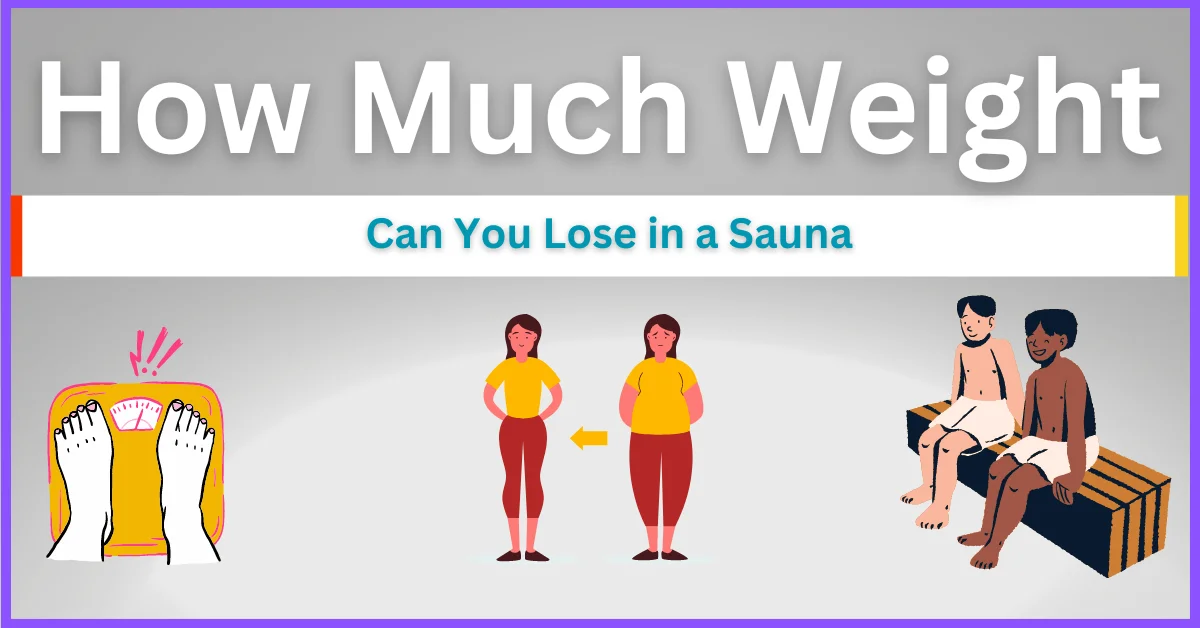How Much Weight Can You Lose in a Sauna? A Guide to Benefits and Risks
Saunas can help you lose weight, burn calories, and improve your health. But they can also pose risks if you use them improperly or excessively. Learn How Much Weight Can You Lose in a Sauna and the benefits and risks in this comprehensive guide.
Saunas are a popular way to relax and unwind, but did you know they can also help you lose weight? While saunas are not a magic bullet for weight loss, they can offer benefits that may support your weight loss goals.
In this blog post, I will share how much weight you can lose in a sauna, the benefits and risks of sauna use, and some tips and tricks to make the most of your sauna experience.
How Much Weight Can You Lose in a Sauna?
Sauna use can lead to temporary water weight loss and burn a few calories, but it’s not a reliable method for significant long-term weight loss.
A balanced diet and regular exercise remain essential for effective weight loss. A sauna can be a helpful addition to your health routine but shouldn’t replace healthy habits.
How Saunas Work
A sauna is a room or a device that uses heat to create a hot and humid environment. There are different types of saunas, such as wood-burning, electrically heated, infrared, and steam saunas. They vary in the temperature, humidity, and heating method they use. However, they all have the same effect on the body: they make you sweat.
Sweating is a natural process that helps regulate your body temperature and eliminate toxins from your skin. You sweat more than usual when you use a sauna because of the high heat and humidity. This can result in some immediate effects, such as:
- Water weight loss: The most apparent effect of a sauna is water weight loss. This is because you lose fluids from your body through sweating. According to Harvard Medical School, you can lose up to one pint of juice during a short sauna session. This can translate to a few pounds of weight loss on the scale but don’t get too excited. This weight loss is temporary and will return as soon as you rehydrate yourself.
- Calorie burning:
- An average 185-pound man will burn around 79-92 calories in a 30-minute sauna session, while a 150-pound woman will burn around 64-75 calories. This is equivalent to walking at a moderate pace for about 15 minutes.
- The main mechanism of calorie burning in a sauna is the increased heart rate and blood circulation from heat exposure. This makes your body work harder to maintain its core temperature and cool itself down through sweating.
- Lipid profile improvement: Another benefit of sauna is lipid profile improvement. This is a measure of your cholesterol and triglyceride levels in your blood. These are essential factors for your cardiovascular health and risk of obesity-related diseases.

Benefits of Sauna Use
Besides water weight loss, calorie burning, and lipid profile improvement, saunas can also offer other benefits for your health and well-being. Some of these benefits include:
- Stress reduction: Saunas can help reduce stress by lowering your cortisol (stress hormone) levels and increasing your endorphins (feel-good hormones) levels. This can improve your mood, sleep quality, and mental clarity.
- Inflammation reduction: Saunas can also help you reduce inflammation by stimulating the production of heat shock proteins (HSPs), which are molecules that protect your cells from damage and repair them when needed. This can help prevent or treat chronic conditions such as arthritis, diabetes, and cardiovascular diseases.
- Detoxification: Saunas can also help you detoxify your body by eliminating toxins through sweat. Toxins can harm your health and interfere with your body’s functions. They can come from various sources, such as food additives, pesticides, air pollution, drugs, alcohol, and cosmetics.
- Some of these toxins can accumulate in your fat cells and make losing weight harder. By sweating in a sauna, you can flush out some of these toxins from your skin and organs.
- Skin health enhancement: Saunas can also help you enhance your skin health by improving its elasticity, texture, tone, and appearance. Your skin is the largest organ in your body. It plays a vital role in regulating your body temperature, protecting you from infections, and synthesising vitamin D.
- However, as you age or gain weight, your skin may lose its firmness, smoothness, glow, and clarity due to various factors such as sun exposure, dehydration, poor nutrition, smoking, stress, and hormonal changes. Regular sauna can improve your skin health by increasing blood flow to the skin surface, opening the pores, removing dead skin cells, stimulating collagen production, and hydrating the skin.
As you can see, saunas can offer many health and well-being benefits beyond water weight loss. They can help you improve your cardiovascular health, immune system, metabolism, mood, and appearance. They can also make you feel more relaxed and refreshed.
Risks of Sauna Use
However, saunas are not without risks. Saunas can also harm your health and safety if you use them improperly or excessively. Some of these risks include:
- Dehydration: The most common risk of sauna use is dehydration. This is because you lose a lot of fluids and electrolytes from your body through sweating. Dehydration can cause symptoms such as thirst, lightheadedness, fatigue, headache, nausea, and muscle cramps.
- It can also lead to more severe complications such as heat exhaustion, stroke, kidney damage, and death. Therefore, drinking plenty of water before, during, and after your sauna session is essential to prevent dehydration and replenish your fluids.
- Overheating: Another risk of sauna use is overheating. This is when your body temperature rises too high and exceeds its normal range. Overheating can cause dizziness, fainting, confusion, rapid heartbeat, low blood pressure, and difficulty breathing.
- It can also lead to more severe complications like organ failure, brain damage, and death. Therefore, it is essential to limit your sauna time to no more than 15-20 minutes per session and avoid using a sauna if you have a fever or an infection.
- Drug or alcohol interaction: Another risk of sauna use is drug or alcohol interaction. This is when the effects of drugs or alcohol are enhanced or altered by the heat and humidity of the sauna. This can cause symptoms such as nausea, vomiting, drowsiness, impaired judgment, and loss of coordination.
- It can also lead to more severe complications such as dehydration, overheating, heart arrhythmia, coma, and death. Therefore, it is essential to avoid using drugs or alcohol before or after your sauna session and consult your doctor if you take any medications that may interact with sauna use.
- Medical conditions: Another risk of sauna use is medical conditions. This is when you have a pre-existing medical condition that may worsen or be triggered by the heat and humidity of the sauna. These conditions include heart disease, high blood pressure, low blood pressure, diabetes, asthma, epilepsy, pregnancy, and menstruation.
NOTE: Therefore, you must consult your doctor before using a sauna if you have any of these conditions or other health concerns.
Related Articles:
- The Impact of Saunas on Health Explores how saunas can positively affect your well-being. Learn about their potential benefits for relaxation, detoxification, and overall health. Read more
- Comparing Infrared vs. Steam Sauna Health Benefits Delve into the differences between infrared and steam saunas and their respective health advantages. Discover which sauna type better suits your health goals. Read more
- Sauna Sessions: Can They Help Shrink the Waistline? Uncover the potential relationship between sauna sessions and weight management. Learn about the effects of saunas on metabolism and their role in supporting a healthier waistline. Read more
Tips and Tricks for Sauna Use
To make the most of your sauna experience and avoid any risks or side effects, here are some tips and tricks for sauna use:
- Check with your doctor: Before using a sauna for the first time or regularly, check if you have any medical conditions or concerns that may affect your sauna use. Your doctor can advise you on using a sauna safely and effectively for your health and fitness goals.
- Choose the correct type of sauna: Depending on your preference and availability, choose the right kind of sauna for you. Different types of saunas vary in temperature, humidity, and heating method. Some may prefer a traditional dry sauna with high temperature and low humidity. Others may prefer an infrared sauna with a lower temperature and direct heat. Others may prefer a steam room with high humidity and moist heat. Experiment with different types of saunas and find out what works best for you.
- Hydrate yourself: Drink at least one glass of water before using a sauna. Drink water every 10 minutes during your sauna session to replenish your fluids. After your sauna session, drink at least two glasses of water to rehydrate yourself. You can also add electrolytes or lemon juice to your water to restore mineral balance.
- Limit your time: Limit your sauna time to 15-20 minutes per session. If you feel dizzy, faint, nauseous, or uncomfortable at any point during your session, get out of the sauna immediately and cool down. You can also take breaks between sessions by showering or sitting in a cool room.
- Avoid drugs or alcohol: Avoid using drugs or alcohol before or after your sauna session. Drugs or alcohol can interfere with your body’s ability to regulate temperature and hydration levels. They can also impair your judgment and coordination and increase your risk of accidents or injuries.
- Wear loose clothing: Wear loose clothing or a towel when using a sauna. A tight dress can restrict your blood flow and prevent sweating. You can also go naked if you are comfortable with it and if the sauna allows it. However, make sure to respect the privacy and comfort of other sauna users and follow the etiquette and rules of the sauna facility.
- Clean yourself: Before using a sauna, shower or wash yourself with soap and water to remove dirt, oil, or sweat from your skin. This can help you sweat more effectively and prevent clogging your pores. After using a sauna, take another shower or wash yourself with cold water to cool down your body and rinse any toxins or impurities from your skin. You can also apply some moisturiser or lotion to your skin to prevent dryness or irritation.
- Eat light: Before using a sauna, eat a light meal or snack high in protein, fat, and sugar. This can help you prevent hunger, nausea, or low blood sugar during your sauna session. Avoid eating heavy, spicy, or greasy foods that may upset your stomach or cause indigestion. After using a sauna, eat another light meal or snack high in carbohydrates and fluids to replenish your energy and hydration levels.
- Listen to your body:
- Listen to your body and how you feel during and after your sauna session.
- If you experience discomfort, pain, or illness, stop using the sauna immediately and seek medical attention if necessary.
- Do not use a sauna if you are pregnant, menstruating, sick, injured, or have any medical conditions that may affect your sauna use.
- Do not use a sauna if you are allergic or sensitive to heat, humidity, or wood.
- Do not use a sauna if you are under 18 years old or over 65 years old without supervision or permission from your doctor.

Visit For more reading about Healing in Style and more information about Saunas.
Final Analysis:
Saunas can be a great way to relax and enjoy yourself, but they can also help you lose some weight. While saunas are not a magic bullet for weight loss, they can offer benefits that may support your weight loss goals. They can help you lose water weight, burn calories, improve your lipid profile, reduce stress and inflammation, detoxify your body, enhance your skin health, and relax and enjoy yourself.












2 Comments